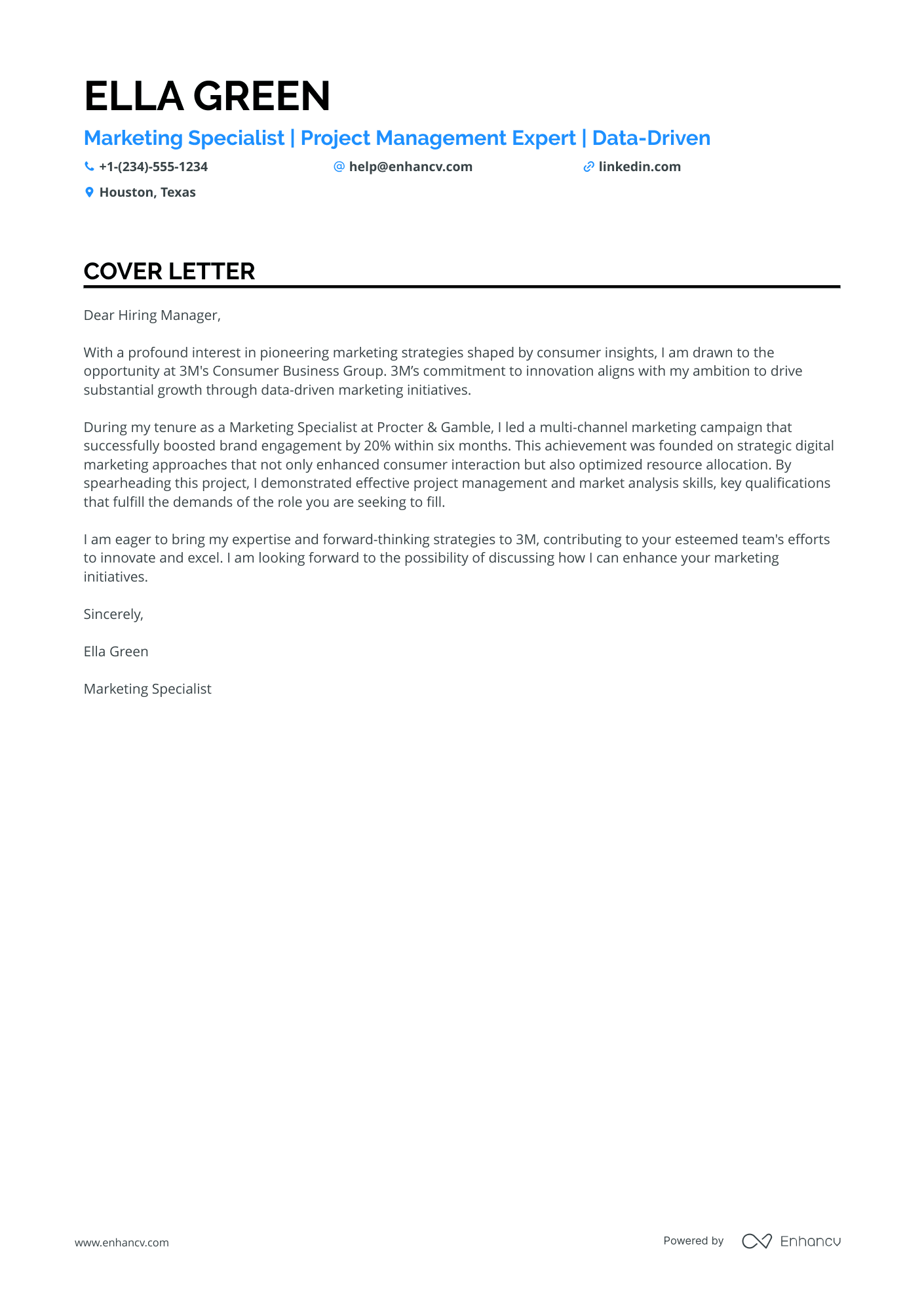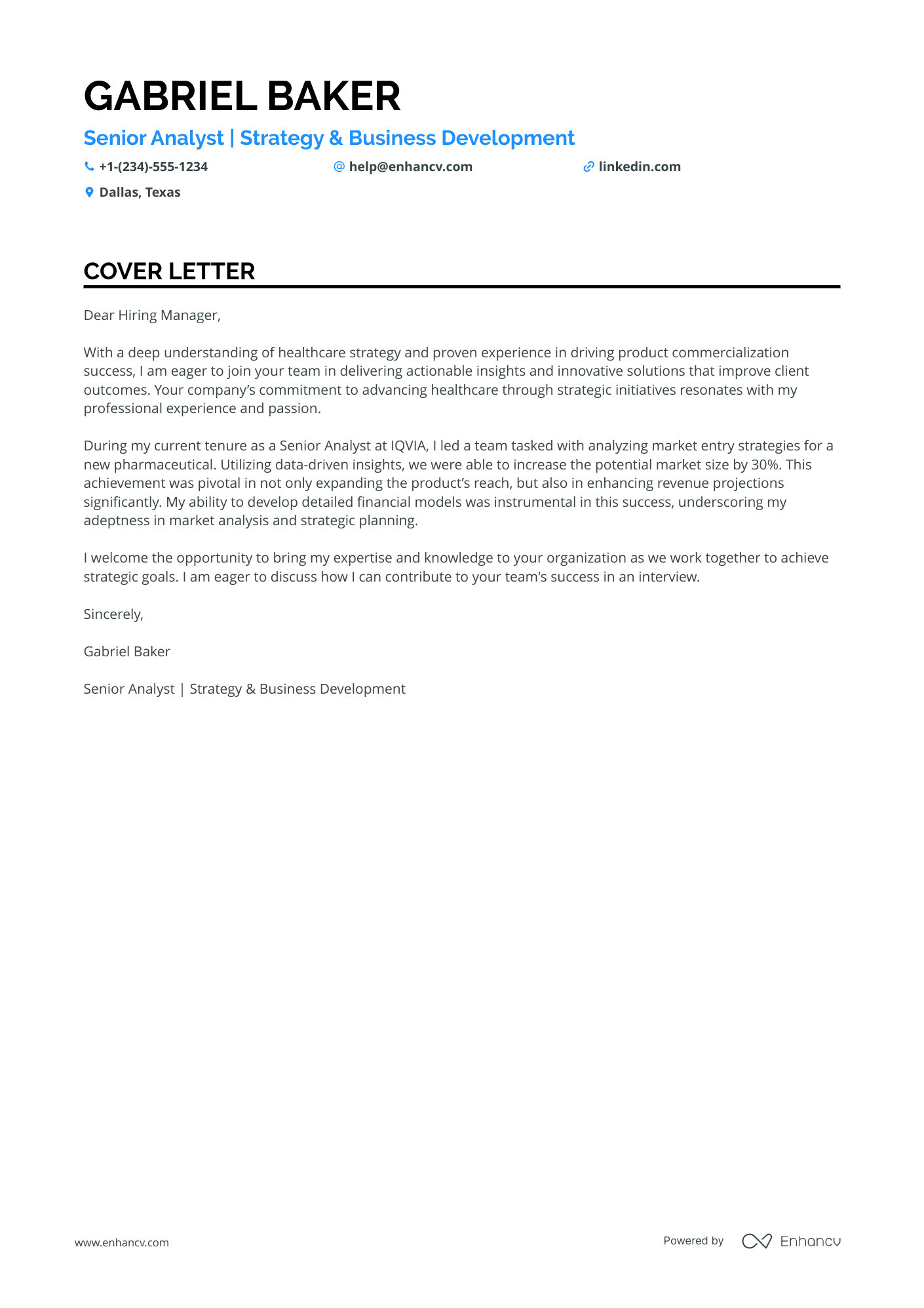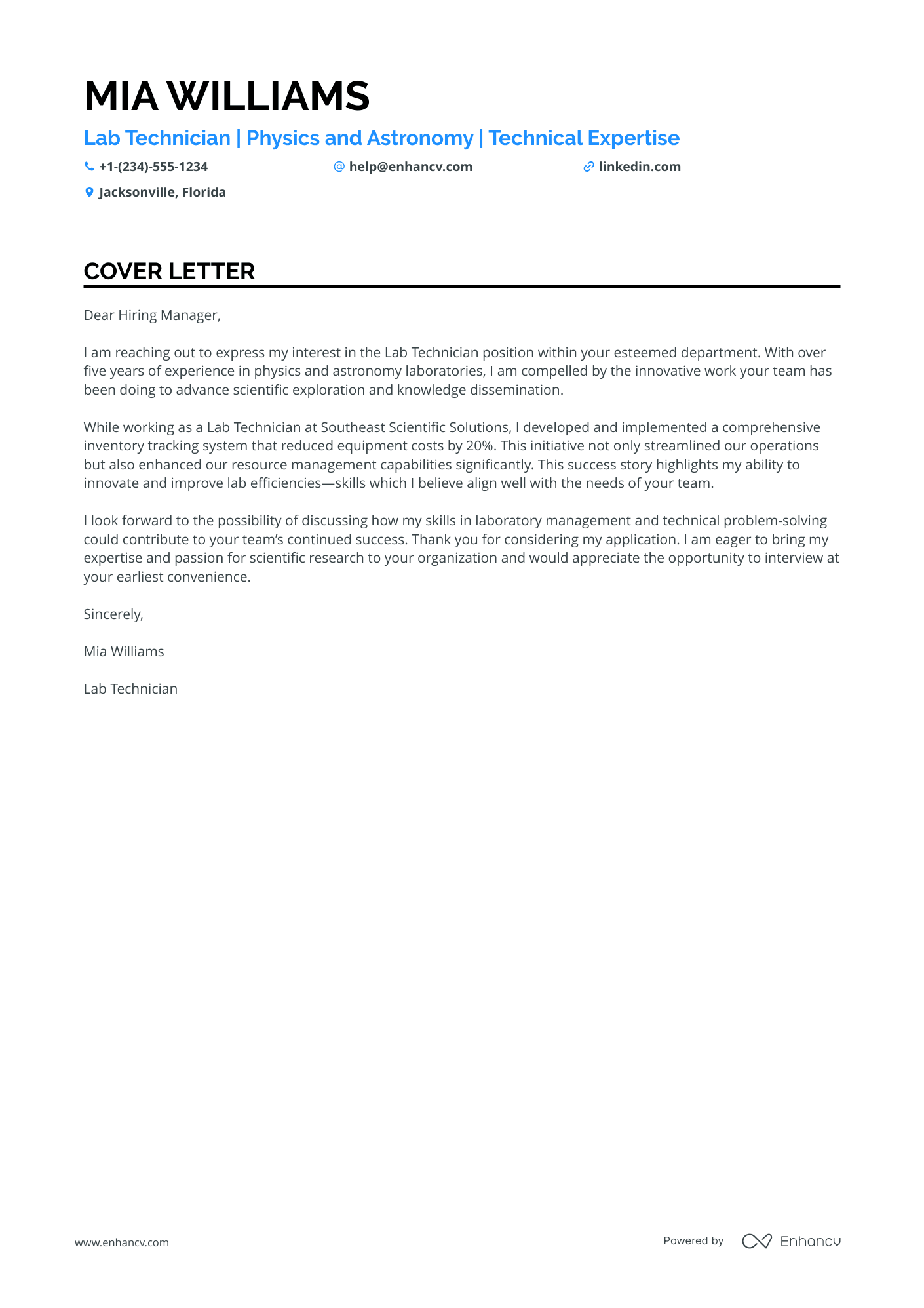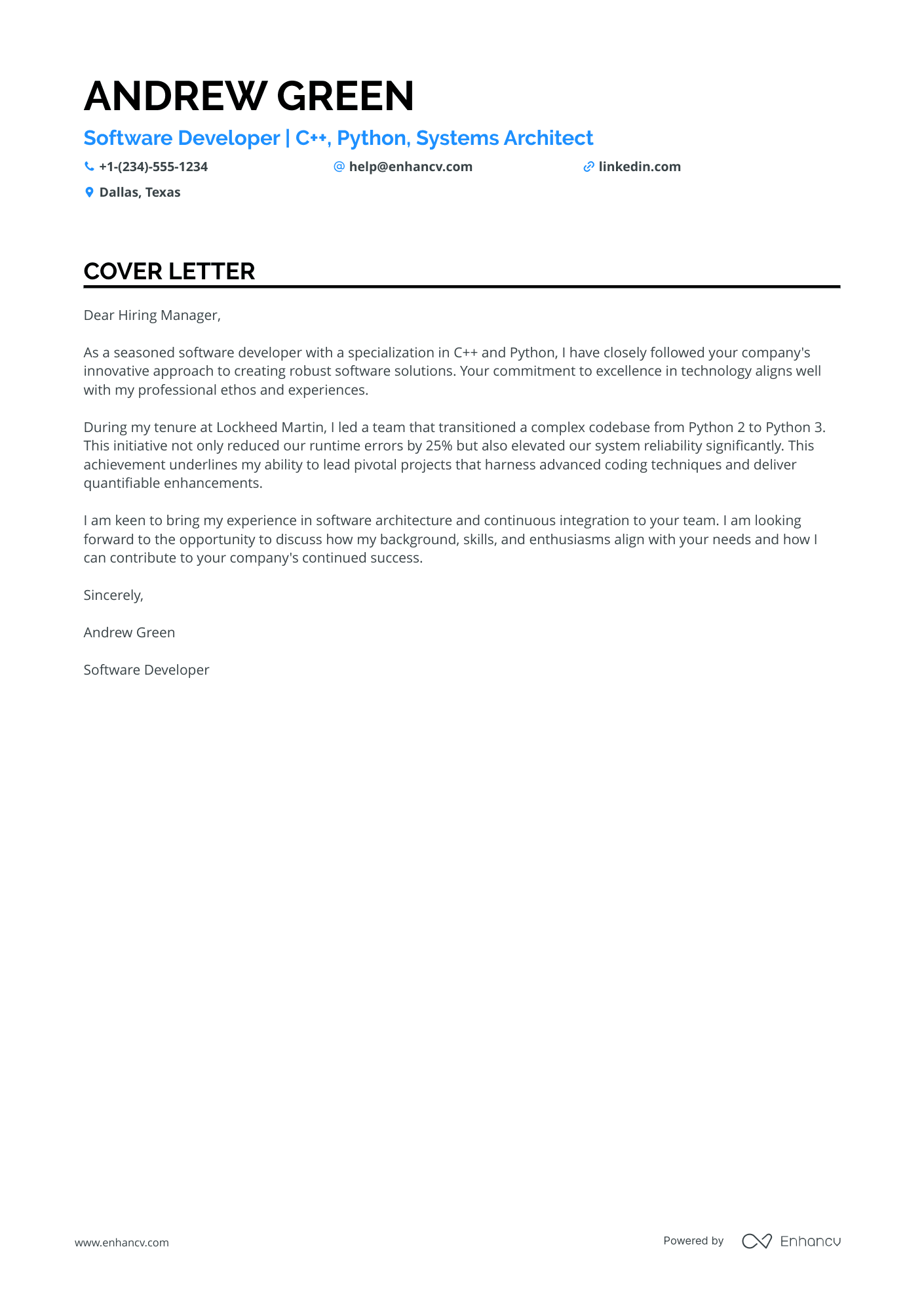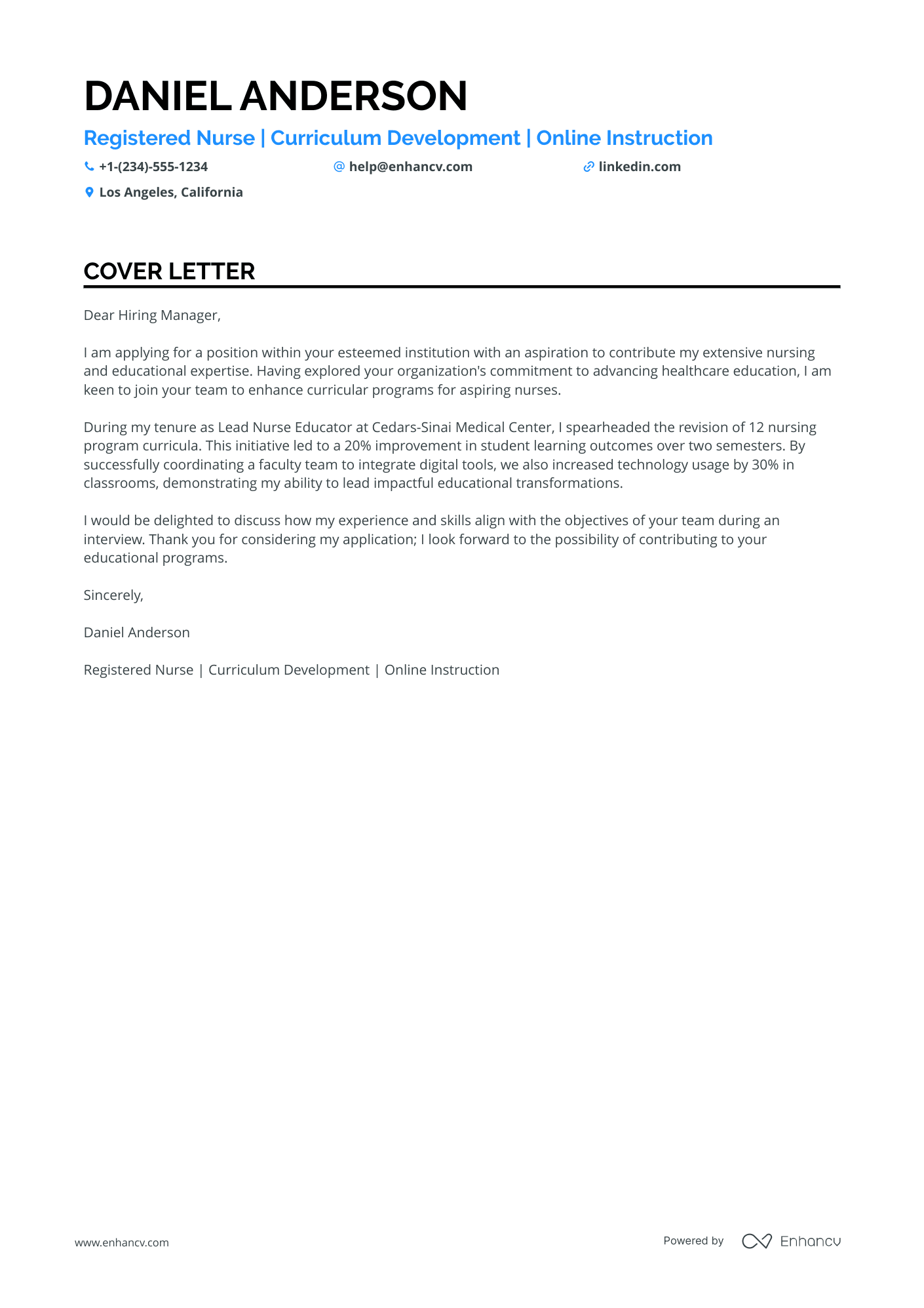Writing your undergraduate cover letter can often feel like a roadblock in your job hunt. You've polished your resume, started applying, and suddenly you hit a wall: the dreaded cover letter. How do you craft a compelling narrative without rehashing your resume? It’s about striking the perfect balance between formal tone and fresh, cliché-free content, all wrapped up in a concise one-page story that spotlights your proudest professional moment. Let’s embark on this journey together to ensure your cover letter stands out for all the right reasons.
- Introduce your profile to catch recruiters' attention;
- Use professional templates and examples to make sure your undergraduate cover letter follows the best industry standards;
- Settle on your most story-worthy achievement to shine a light on what makes your application unique;
- Write a undergraduate cover letter, even when you lack professional experience.
Ready to start with the basics: upload your resume to Enhancv's AI, below, to see the undergraduate cover letter it would write for you.
If the undergraduate isn't exactly the one you're looking for we have a plethora of cover letter examples for jobs like this one:
Drop your resume here or choose a file.
PDF & DOCX only. Max 2MB file size.
Undergraduate cover letter example
TAYLOR FOSTER
Riverside, CA
+1-(234)-555-1234
help@enhancv.com
- Highlighting relevant experience: The cover letter mentions a specific achievement during the candidate's summer internship at Salesforce, showcasing their hands-on experience with cloud infrastructure and problem-solving abilities.
- Demonstrating impact: The letter quantifies the candidate's contributions by stating a "30% improvement in incident resolution time," which helps the hiring manager understand the tangible value the candidate can bring to the team.
- Proactive attitude: The cover letter emphasizes the candidate's proactive approach to identifying and solving problems, which is a highly valuable trait in the fast-paced tech industry.
- Alignment with the company's culture: The candidate mentions their alignment with the "innovative work culture" at the company, suggesting that they're not only a fit for the role technically but also culturally.
What about your undergraduate cover letter format: organizing and structuring your information
Here is one secret you should know about your undergraduate cover letter assessment. The Applicant Tracker System (or ATS) won't analyze your cover letter.
You should thus focus on making an excellent impression on recruiters by writing consistent:
- Header
- Greeting
- Introduction
- Body paragraphs (and explanation)
- Promise or Call to action
- Signature (that's optional)
Now, let's talk about the design of your undergraduate cover letter.
Ensure all of your paragraphs are single-spaced and have a one-inch margins on all sides (like in our cover letter templates).
Also, our cover letter builder automatically takes care of the format and comes along with some of the most popular (and modern) fonts like Volkhov, Chivo, and Bitter.
Speaking of fonts, professionals advise you to keep your undergraduate cover letter and resume in the same typography and avoid the over-used Arial or Times New Roman.
When wondering whether you should submit your undergraduate cover letter in Doc or PDF, select the second, as PDF keeps all of your information and design consistent.
Why worry about your cover letter? Create one instantly using our free cover letter generator.
The top sections on a undergraduate cover letter
- Header: Includes your contact information, the date, and the employer’s contact information, which is essential for making sure your cover letter reaches the right person and they can easily reply to you.
- Greeting: A formal salutation addressing the hiring manager by name conveys your attention to detail and genuine interest in the position.
- Introduction: Briefly introduces who you are, your educational background, and the specific job you are applying for, helping the recruiter understand your intentions immediately.
- Body: Describes your relevant skills, experiences, and achievements that pertain to the role, demonstrating how your academic and extracurricular experiences make you a perfect fit for the position.
- Closing: A professional closing that reiterates your enthusiasm for the role, includes a call to action encouraging the recruiter to contact you for an interview, and thanks them for considering your application.
Key qualities recruiters search for in a candidate’s cover letter
As the job title was not specified in the prompt, I'll provide a general list of qualities, experiences, and traits that recruiters often prioritize in undergraduate cover letters across various roles. If you have a specific job title in mind, please provide it, and I can tailor the list accordingly.
- Academic excellence or relevant coursework: Demonstrates the ability to master job-related knowledge and concepts.
- Internships or related job experience: Shows practical experience and an understanding of the work environment.
- Leadership roles in student organizations or projects: Highlights management potential and team collaboration skills.
- Volunteer work or community involvement: Reflects a commitment to social responsibility and strong ethical values.
- Technical skills specific to the industry: Indicates readiness to contribute practically from day one, reducing training time.
- Effective communication skills: Essential for teamwork, customer interactions, and clarity in professional settings.
What matters most when tailoring your undergraduate cover letter salutation
Your undergraduate cover letter greeting should feel welcoming to recruiters.
Use their first name (e.g. "Dear Marshall" or "Dear Sara"), if you've previously been in touch with the hiring manager and are on a more friendly basis.
If this is the first time you're contacting the recruiters, start your undergraduate cover letter with:
- their last name (e.g. "Dear Ms. Ali" or "Dear Mr. Stevens") - look up who's the hiring manager for the role on social media or the company website;
- generalized greeting (e.g. "Dear HR Team") - just don't use "To whom it may concern" or "Dear Sir/Madam".
List of salutations you can use
- Dear Hiring Manager,
- Dear [Department] Team,
- Dear [Mr./Ms./Dr.] [Last Name],
- Dear [Mr./Ms./Dr.] [Last Name] and Team,
- Dear [Team or Department Name] Hiring Committee,
- Dear [Job Title] Search Committee,
Get creative with your undergraduate cover letter introduction
Recruiters are going to assess plenty of candidate profiles for the role. Thus, anything you do to stand out will win you brownie points.
Use your undergraduate cover letter introduction to share something memorable about your experience.
But before you go down the rabbit hole of creativity and humor, align your message with the company culture.
For example, if you are applying for a role in some startup, use those first two sentences to tell a funny story (about your experience) to quickly connect with the recruiter.
What comes next: your undergraduate cover letter middle paragraphs
In the next three to six paragraphs (or the body of your undergraduate cover letter) you have to prove your unique value.
Most candidates tend to mess up at this stage. They tend to just copy-paste information from their resume.
That's one big no-no.
Remember that when writing your undergraduate cover letter, it has to be personalized. And, your ultimate aim is to catch the recruiter's eye.
So, look back on key job requirements and write down a list that includes the ones you cover.
Next, select just one key achievement from your professional (or personal) history that meets those advert keywords.
Narrate a story around how you've grown your skill set and knowledge. Also, aim to show the unique understanding or soft skills you bring about, thanks to your past success.
A sincere and original way to end your undergraduate cover letter
When writing their undergraduate cover letter, candidates tend to use one of these phrases, "Sincerely yours" or "I look forward to hearing from you".
Both statements show good manners, but your cover letter should end in a more actionable manner.
Write about:
- how you see yourself growing in the role/organization;
- the benefits you would bring about (you'd impress even more with tangible metrics);
- the next steps in the process (provide your availability for interviews).
Lacking experience: here's how to write your undergraduate cover letter
As a candidate with no experience, it's important to be honest from the get-go of your application.
Use your undergraduate cover letter to sell your unique talents. Choose an accomplishment from your academic background or your volunteer work to show the skills that are relevant to the role.
Focus on your career objectives and how you see the job to align with them. Be specific and, at the same time, realistic about where you picture yourself in five years.
Key takeaways
Writing your undergraduate cover letter doesn't need to turn into an endless quest, but instead:
- Create an individual undergraduate cover letter for each role you apply to, based on job criteria (use our builder to transform your resume into a cover letter, which you could edit to match the job);
- Stick with the same font you've used in your resume (e.g. Raleway) and ensure your undergraduate cover letter is single-spaced and has a one-inch margin all around;
- Introduce your enthusiasm for the role or the company at the beginning of your undergraduate cover letter to make a good first impression;
- Align what matters most to the company by selecting just one achievement from your experience, that has taught you valuable skills and knowledge for the job;
- End your undergraduate cover letter like any good story - with a promise for greatness or follow-up for an interview.
Undergraduate cover letter examples
By Role
Undergraduate Marketing Intern
- Emphasize relevant past experiences and achievements, such as leading successful marketing campaigns and increasing brand engagement, to demonstrate capability and effectiveness in similar roles.
- Highlight specific skills that are aligned with the job requirements, like digital marketing strategies, project management, and market analysis, showcasing a match with the company's needs.
- Express genuine interest in the company's values and mission, showing enthusiasm for contributing to their goals and growth, which can establish a connection with the employer.
Undergraduate Financial Analyst
- Specific Achievements: Clearly highlight a specific achievement, such as increasing market size by 30% for a pharmaceutical product, demonstrating the applicant's direct impact on business outcomes.
- Quantifiable Results: Include quantifiable results to add credibility and impact to accomplishments, showcasing the applicant's ability to drive substantial improvements in projections or performance metrics.
- Industry-Specific Skills: Emphasize relevant skills, such as the development of detailed financial models, to underline expertise that is directly applicable to the role within the healthcare strategy and business development fields.
- Alignment with Company Goals: Express clear alignment with the company’s mission and strategic initiatives, highlighting the applicant’s enthusiasm for contributing to shared objectives and innovation in healthcare.
Undergraduate Lab Technician
- Highlighting industry-specific achievements: The letter emphasizes a significant accomplishment in reducing equipment costs by 20% through efficient inventory management, showcasing the applicant's ability to improve lab operations.
- Aligning personal skills with company needs: The applicant draws a connection between their skills in innovation and lab efficiency with the prospective employer's goals, demonstrating an understanding of their requirements and how they can meet them.
- Expressing genuine interest in the organization: The opening paragraph reflects an understanding of the department's innovative work, indicating that the applicant has researched the company and is genuinely interested in contributing to its mission.
Undergraduate Software Developer
- Alignment with Company Values: The cover letter does a great job of aligning the applicant's professional ethos with the company's commitment to excellence in technology, which is crucial for roles that require deep integration into the company's vision and goals.
- Showcasing Leadership and Impact: By detailing a specific project where the applicant led a team to transition a codebase, the letter highlights leadership skills and the ability to drive projects that have a measurable impact, essential for senior roles in software development.
- Detailing Technical Expertise: Mentioning the specialization in C++ and Python immediately establishes the candidate's technical expertise, which is important for roles that require specific programming skills.
- Engagement and Future Contribution: Expressing eagerness to bring experience in software architecture and continuous integration suggests the candidate's intent to make immediate and future contributions to the team, which is attractive to employers.
Undergraduate Nursing Assistant
- Highlighting Leadership in Curriculum Development: The letter emphasizes the applicant's role in spearheading curriculum revisions and leading a faculty team, showcasing leadership and initiative critical for a Nurse Educator role.
- Quantifying Achievements: By mentioning a 20% improvement in student learning outcomes and a 30% increase in technology usage, the applicant effectively quantifies their impact, providing concrete evidence of their success.
- Aligning with Organizational Goals: The applicant expresses a clear understanding of and alignment with the institution's goals in healthcare education, which demonstrates research and a tailored approach.
- Invitation for Further Discussion: The letter concludes with a willingness to further discuss skills and experience, showcasing professionalism and eagerness for the opportunity.
